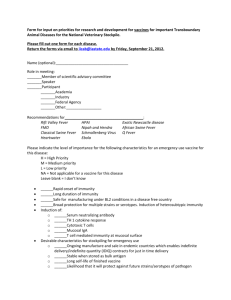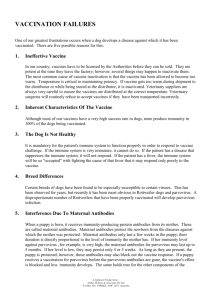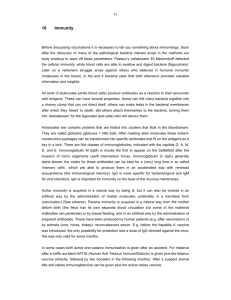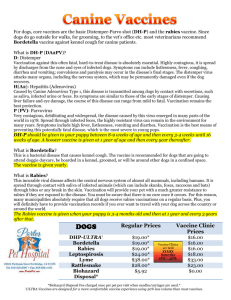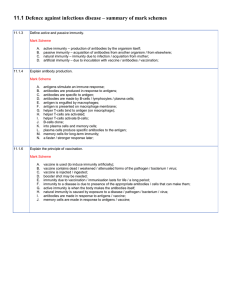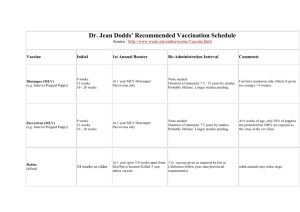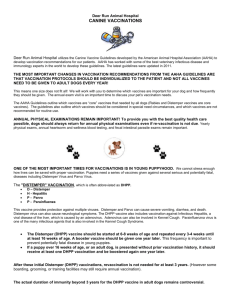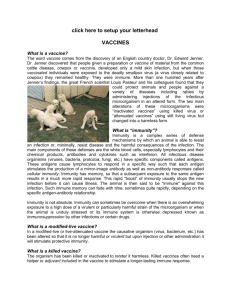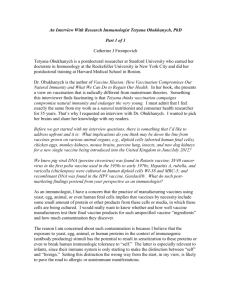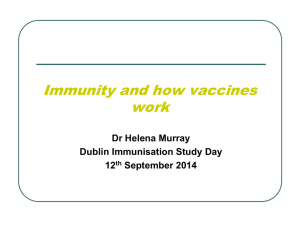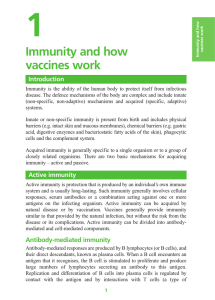Canine Vaccination Guidelines
advertisement
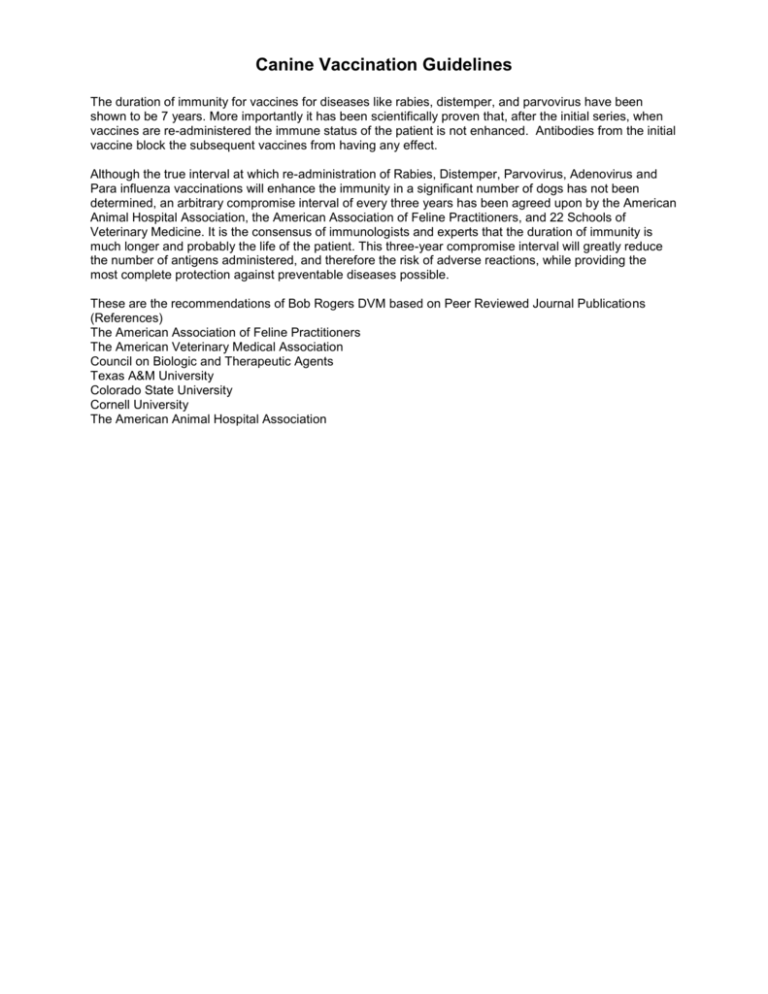
Canine Vaccination Guidelines The duration of immunity for vaccines for diseases like rabies, distemper, and parvovirus have been shown to be 7 years. More importantly it has been scientifically proven that, after the initial series, when vaccines are re-administered the immune status of the patient is not enhanced. Antibodies from the initial vaccine block the subsequent vaccines from having any effect. Although the true interval at which re-administration of Rabies, Distemper, Parvovirus, Adenovirus and Para influenza vaccinations will enhance the immunity in a significant number of dogs has not been determined, an arbitrary compromise interval of every three years has been agreed upon by the American Animal Hospital Association, the American Association of Feline Practitioners, and 22 Schools of Veterinary Medicine. It is the consensus of immunologists and experts that the duration of immunity is much longer and probably the life of the patient. This three-year compromise interval will greatly reduce the number of antigens administered, and therefore the risk of adverse reactions, while providing the most complete protection against preventable diseases possible. These are the recommendations of Bob Rogers DVM based on Peer Reviewed Journal Publications (References) The American Association of Feline Practitioners The American Veterinary Medical Association Council on Biologic and Therapeutic Agents Texas A&M University Colorado State University Cornell University The American Animal Hospital Association Vaccination Schedule: Core vaccines – recommended for all dogs Vaccine Initial >12 Weeks 1st Annual 1st Annual 1st Annual Rabies (killed) 16 weeks One vaccination 1 yr after the initial vaccination Every 3 years. Distemper (MLV) 8 weeks 12 weeks 16 weeks 2 doses 3-4 weeks apart Yes. Will provide lifetime immunity AAHA- 8 weeks 12 weeks 16 weeks 2 doses 3-4 weeks apart Yes – None needed. Duration of immunity 7.5 years by studies. Probably lifetime. Longer studies pending. Due to age & maternal antibodies, closer to 4 months is better Recombinant vaccine for breeds like Weimaraners may prevent HOD At 6 weeks of age, only 30% of puppies are protected but 100% are exposed to the virus at the vet clinic. Parvovirus (MLV DOI 7 yrs+ Probably lifetime Every three years (compromise) Non-Core: Only recommended where there is a chance of exposure Bordetella (Intranasal) (killed) Leptospirosis Lyme Intra Nasal 4 Mfg Yes Annually Para days prior to recommends influenza only boarding one dose protects Immune (Para Inj. 3 weeks against 1 of response is influenza prior to 8+ causes of faster with every 3 Boarding Inj Kennel boosters years?) followed by Cough Intra Nasal demonstrated Bordetella better protection Intranasal Bordetella takes effect in 72 hrs to take effect vs injectable requires 2 weeks to take effect. Recommended 3 days prior to boarding, grooming & dog shows. Protects against 2 of the possible 8 causes of kennel cough. Duration of immunity 6 months. 1.) There are an average of 12 cases of Lepto annually in Texas. 2.) Side effects are common. 3.) The most commonly used vaccine contains the wrong serovars. (There is no cross-protection of serovars) There is a new vaccine with 2 new serovars. Two vaccinations twice per year would be required for protection.) 4.) The risk of side effects outweighs benefits. 1.) Vector tick/reservoir relationship not in Texas 2.) 85% of cases are in 9 New England area States, Minnesota and Wisconsin. 3.) There is a possible side effect of polyarthritis from the vaccine. Vaccines Not Recommended For Dogs Distemper & Parvo @ 6 weeks or younger Giardia Corona Not recommended. At this age, maternal antibodies form the mothers milk (colostrum) will neutralize the vaccine and only 30% for puppies will be protected. 100% will be exposed to the virus at the vet clinic. Not recommended 1. Efficacy of Vaccine unsubstantiated by independent studies. 2. IgA mucosal antibodies? Immunity against a complex organism? 3. Natural infection does not provide immunity. Not recommended. 1. Disease only affects dogs < 8 weeks of age. 2. Corona is a rare disease, only 1 case reported in 7 yrs at each of these Vet Schools: TAMU, Cornell, Colo.St., U.Cal.@ Davis 3. Efficacy of vaccine questionable, IgA Mucosal antibodies needed Extra vaccinations for Rottweilers at 20 weeks, etc, are not necessary if high titer Parvovirus vaccines are used. “Booster Vaccination” before breeding- does not increase maternal antibody transfer in colostrum. Nosodes – Study by Dr. Ron Schultz demonstrated no efficacy. Not recommended: Greene’s Infectious Diseases Distemper and Parvo at 6 weeks – exposure to disease will be increased by visiting a Veterinary hospital while only 30% of puppies will be protected, due to maternal antibody interference with vaccine. Vaccination by a breeder at home with Parvo only may help prevent losses but will delay next vaccination to 9 weeks.
